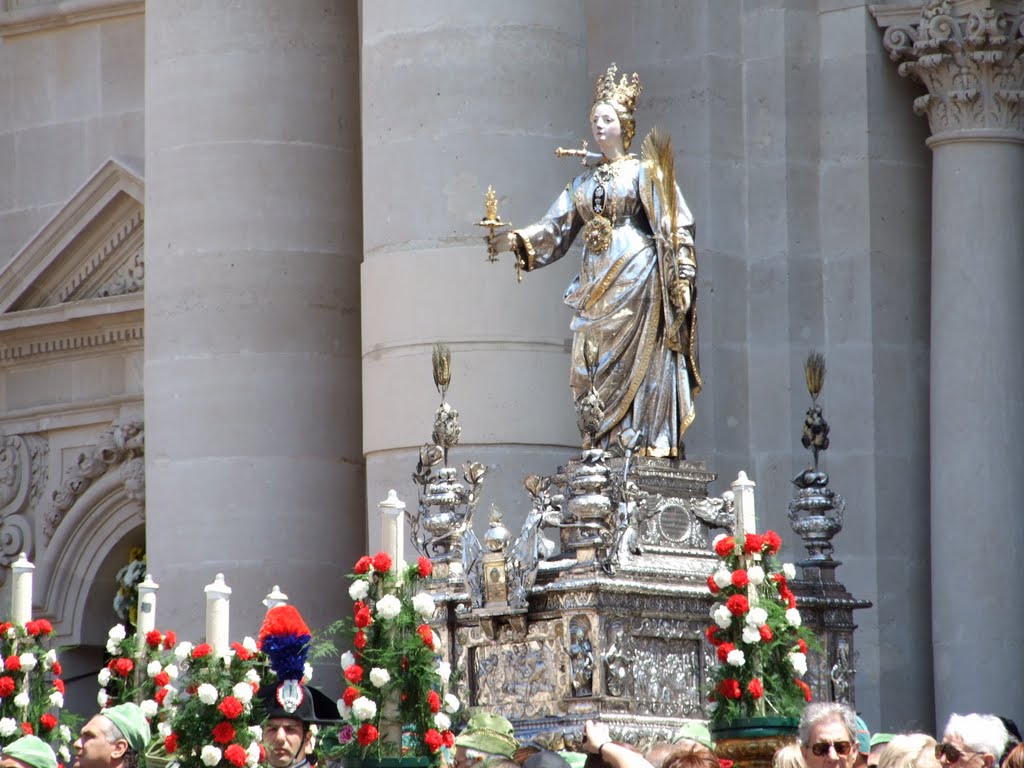Her story has come down to us through martyrdom records, traditions, popular narratives, and legends. Lucia was born at the end of the 3rd century in Syracuse (Italy) into a wealthy and high-ranking family. Educated as a Christian, she was still a child when she lost her father. Her mother Eutiquia raised her with love and dedication. Even as an adolescent, Lucia planned to consecrate herself to God but kept this desire in her heart. Ignorant of her daughter’s intentions, Eutiquia betroths her as a wife – according to the custom of the time – to a young man from a good but non-Christian family. Lucia does not reveal her intention to remain a virgin for Christ, and postpones the wedding on various pretexts, trusting in prayer and divine help.
The journey to Catania and the intercession of St. Agatha
In 301, Lucia and her mother set out on a pilgrimage to Catania to visit the tomb of St. Agatha. Eutichia was suffering from haemorrhages and, despite numerous and costly treatments, she was not getting any better. Mother and daughter wished to ask for the grace of healing through the intercession of St. Agatha, the young martyr of Catania.
So on 5 February, they arrived at the slopes of Mount Etna; it was Agatha’s dies natalis. They took part in the Eucharistic celebration at the tomb of the saint. And it happens that, on hearing the Gospel episode of the haemorrhoid who was cured by touching the hem of the Lord’s garment, Lucia turned to her mother and said: “Mother, if you believe the things that have been read, you will also believe that Agatha, who suffered for Christ, has free and trusting access to his tribunal. Therefore, touch her tomb with confidence, if you wish, and you will be cured” (Passion of Saint Lucy).
Eutychia and Lucy then approach the tomb of Agatha. Lucia prays for her mother and implores for herself the grace to be able to dedicate her life to God. Absorbed in a kind of dream, as if in ecstasy, she sees Agueda among angels who say to her: “Lucia, my sister, and virgin of the Lord, why do you ask of me what you yourself can obtain? Your faith has been of great help to your mother, she is already cured. And just as the city of Catania is full of graces because of me, so the city of Syracuse will be preserved because of you because it has pleased Our Lord Jesus Christ that you have preserved your virginity”. When she came to, Lucia recounted her vision to her mother, revealed her intention to renounce an earthly husband, and asked for permission to sell her dowry to do charitable works for the poor.
Martyrdom
Disillusioned and resentful, the young man who coveted her hand denounced her to the prefect Pascasius, accusing her of worshipping Christ and disobeying the rules of Diocletian’s edict. Arrested and brought before the prefect, Lucia refuses to sacrifice to the gods, and proudly professes her faith: “I am a servant of the eternal God, who has said: ‘When they bring you before the magistrates and the authorities, do not worry about how you are to speak or what you are to say in self-defence, for at that very moment the Holy Spirit will teach you what you ought to say'”.
Pascasio asked her: “So, do you believe that you have the Holy Spirit? Lucia replies”: “The Apostle said: ‘The chaste are the temple of God, and the Holy Spirit dwells in them'”. Pascasius, to discredit her, orders her to be taken to a brothel. But Lucia declares that she will not yield to the lust of the flesh and that since her body will suffer violence against her will, she will remain chaste, pure, and undefiled in spirit and mind. When they try to take her away, the soldiers are unable to move her. Bound hand and foot, they cannot drag her even with the help of oxen. Exasperated by this extraordinary event, Pascasius arranges for the young woman to be burned alive. But the fire does not harm her. Furious, Pascasius ordered Lucia to be beheaded, and so the young martyr died on 13 December 304.










